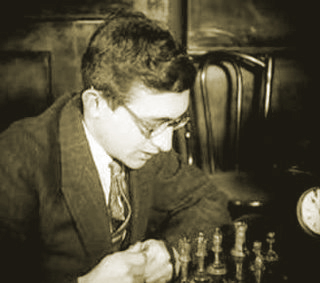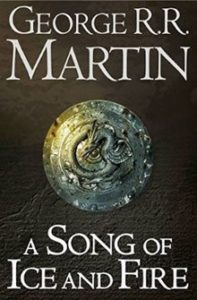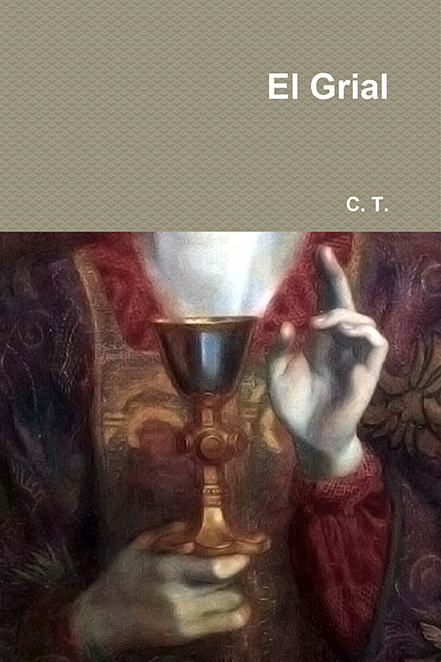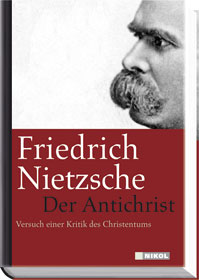by Tom Sunic
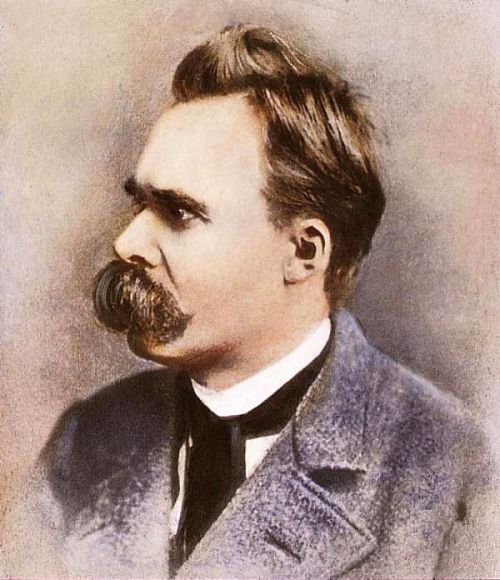
Note of the Editor: Of the intellectuals of contemporary white nationalism, I only have respect for Tom Sunic, who like me is aware of the Christian problem and how capitalism is poison for the fourteen words. The difference is that he speaks in a very polite manner and I in a very rude manner.
For example, I am delighted these days because Murka, which has been the greatest promoter of both capitalism and Judeo-Christianity, is going to die thanks to the crisis unleashed by the coronavirus (the pin) and the Fed (the bubble), as can be seen in my most recent posts.
On the other hand, in an article published today on The Occidental Observer the Croatian Sunic focuses on Europe:
______ 卐 ______
To each his own Nietzsche. With this sentence one could start yet another discussion on this famous and famed thinker. Given the staggering number of works about him it is essential to raise the question: which Nietzsche should one read first? Should one read Nietzsche’s own prose first, or should one first read works by other authors who have written about him? And which work and by which author? The problem is all the more serious as there are no two works, no two authors among tens of thousands that are in agreement on the same interpretation of Nietzsche’s ideas. Of course, the same remark could be leveled against my own interpretations of Nietzsche. My understanding, interpretation and choice of words regarding Nietzsche’s thoughts may be different from those of other authors who claim to be his best interpreters. Consequently, I may be accused of using interpretations that may not be shared by Nietzsche or his countless interpreters.
What needs to be highlighted, however, is the link established by Nietzsche between Christian values and their secular offshoots used now by the ruling class in the West as a legal and psychological basis for the arrival of non-European migrants into Europe. The System, through its sermons about human rights, whose ideological origins go back to early Christianity, is quite successful in destroying European peoples and cultures.
Aside from being an influential philosopher Nietzsche was also a philologist who understood well the subtleties of political language. Therefore, one should first single out some of his words and find out their conceptual equivalents in the French and in the English languages today, especially in the realm of higher education and high-level political rhetoric. One must keep in mind that his denunciations of Christian morality are contrasted with his praise of combative virtues of the old Greco-Roman “virtù” stripped of any modern moralinfreie Tugend. Nietzsche invented the word “moraline” in order to combat the excessive moralizing of the Church and the ruling class of this time. Strangely enough the word “moraline” is never used today in the modern German language, having also no adequate substitute in the English language. The great German-American connoisseur and translator of Nietzsche, H.L. Mencken translated moralinfreie Tugend as “free of moral acid.” By contrast, modern French nationalists, when deriding the fake news of the modern System, often resort to the original German “moraline.” In the USA, however, this word could be substituted by its conceptual equivalent of “virtue-signalling.”
When transposed into our own language Nietzsche’s words read like a harsh condemnation of the modern System with its invocations of words such as “humanity,” “peace” and “tolerance.” The goal of the System is to force citizens of European extraction to become prey to perpetual feelings of guilt. This is how Nietzsche predicted the modern unfolding of the System hundred and thirty years ago:
Almost everywhere in Europe today, there is a morbid over-sensitivity and susceptibility to pain, as well as an excessive amount of complaining and an increased tenderness that wants to dress itself up as something higher, using religion as well as bits and pieces of philosophy—there is a real cult of suffering.
In addition to his denunciation of Christian morality Nietzsche levels harsh criticism against Christian providentialism which manifests itself today in the gregarious spirit of mass democracy. Of course, the System needs to sugarcoat modern, secularized versions of Christian teachings in the mystique of human rights, in the myth of multiculturalism, in the decrees on race-mixing, and in the usage of politically correct verbiage. Pity for those who failed, for lowlifes, for criminals, including illegal Third World migrants in search of a better life in Europe, has become a mandatory vogue in political and media outlets. Professor Pierre Chassard, who could be ranked as first among French “New Right” interpreters of Nietzsche, defines Nietzsche’s criticism of Christian providentialism: “The wretched of the Earth, who are nailed to the cross, may be the only fortune tellers. Life misfits may be the elect of heaven. Only they are the good guys and others are the bad guys.” The list of self-engineered misfits could grow longer if one were to add numerous White politicians and academics burdened by self-hate and choosing therefore to become purveyors of the dogma of interchangeability of peoples, races, and genders. Such a self-hating behavior, of which Nietzsche was the first critic, is today the trademark of the System.
One could start with the expression “the great replacement.” This wording, coined by the writer Renaud Camus, is deemed unworthy by the System. Nonetheless, although Camus’ book is very useful, its title may be subject to misunderstanding. Instead of the expression “the great replacement,” one is tempted to use a more specific expression: “the great invasion.” However, even the term “invasion” harks back to the notion of the political of the previous centuries when its use was generally accompanied by an armed conflict—which is not the case for the time being with the floods of non-Europeans who are being adorned by the Western media with the sentimental title “refugees.” Understandably, the System and its scribes must avoid the usage of the terms “invasion” or “replacement,” preferring instead the romantic expressions such as “cultural enrichment” or “diversity”—terms which went global after having first appeared in the American language in the 80s of the previous century. Moreover, even if one were to agree on the label “invasion” when describing Afro-Asian migrants on their way to Europe, the choice of this word would take us far off into the field of polemology, a subject that can be tackled only in passing.
According to Nietzsche the moralization of politics leads to chaos which he labels with the word “democracy.” It is incumbent therefore upon his readers to study the effects of democracy peddled globally by the System if one was to grasp the incoming tide of chaos. To that effect it suffices to listen to the hypermoralistic language of the ruling class in order to realize that the true goal of their political experiments—dubbed “democracy” and “diversity”—is nothing else but a gigantic hoax. The outpouring of hypermoralistic narratives among Euro-American leaders, other than serving as a legal smokescreen for humanitarian actions on behalf of non-European migrants, also functions as a grand cover up for the repression against independent thinkers.
In Bismarck’s Germany at the end of the nineteenth century, Nietzsche did not need to confront mass migratory inflows of non-Europeans. Much earlier, however, he had grasped the origins and the global dynamics of the hypermoralistic mindset that had already taken root among politicians and intellectuals of his time—either in its liberal version or in its crypto-communist form. That early bourgeoning hypermoralistic endeavor, whose goal was the creation of the best of all worlds, or the shining communist futures, was bound to lead, a hundred years after Nietzsche’s death, to multicultural chaos observed today.
It is pointless to scorn migrants, the majority of whom are Muslim non-Europeans, without however deciphering moralistic, globalist, altruistic and ecumenical ideas that have been peddled around by the Church over the last two thousand years. It was Nietzsche’s merit to be the first to grasp that all our current political concepts, all abnormalities in the liberal system are just secular derivatives of Christian thought, “whereby this morality is increasingly apparent in every political and social institution; the democratic movement is the heir to Christianity.”
In the System today, which claims to be the best, any criticism of parliamentary democracy, or multiculturalism, let alone of miscegenation, is bound to enter the framework of the penal code or the demonology of its mainstream media executioners. While on the one hand the System prides itself on being tolerant, claiming to extend unrestricted voice even to its critics, while hiding behind the words of tolerance, diversity and humanism, on the other, it exerts total control of its population—a phenomenon hitherto unseen in the entire history of the West. From the point of view of modern languages, from the point of view of the notion of the political, the System is succeeding in reversing real European values and replacing them with surreal ones. Within the framework of these new moralizing and ecumenical values, described by Nietzsche and transposed now into the modern System, it can be expected that non-European masses entering Europe, will describe themselves as “poor refugees.” Incidentally, the term “refugees” is not of their choice; it is being bestowed on them by the System and its sycophant media.
This is how professor Alfred Baeumler, one of Nietzsche’s disciples in the first part of the twentieth century and later to become a high-ranking academic in National Socialist Germany, depicts the nihilistic message inherent in the language of liberal democracy in Europe between the two wars.
Nihilism, chaos, is the inevitable consequence of the belief in harmony without struggle, a belief in indiscriminate (gegensatzlos) order. True order only arises from the power relationship spawned by the will to power… Only chaos is inhumane. The rule of tolerance and moral ideas, of reason and of compassion, in short of “humanity,” always leads to inhumanity.
Doubling down on his exotic doppelganger
As a follow-up to such hypermoralistic endeavors conducted by the System one can observe its politicians being more and more inclined toward splitting their own selves—a process which they subsequently project on non-European migrants who are cherished now as the beacon of progress and innocence. Such a process of White self-denial is especially visible in Germany, a country which in 1945 was forced to remake its identity. As an illustration of German split-mindedness or dopplengaegertum, one could mention several authors of fantastic tales at the beginning of the nineteenth century who, by indirection, best predicted the fractured identity of Europeans and especially the German people two hundred years later. A good example is the famous horror story writer E. T. A. Hoffmann and his novella The Sand Man. The main character of his tale falls in love with a machine which resembles an attractive woman he had previously fabricated in his self-delusional mind. Toward the end of the tale the imaginary woman-automaton pushes the unfortunate hero to suicide. Today, we are witnessing a similar mechanical and suicidal fixation by great many German and European politicians, who, as a rule, must pretend to be enamored with fictitious and exotic Third World migrant imagery, and who are overjoyed at the thought of demolishing their own identity and replacing it with the newly borrowed make-believe Afro-Asian identity. This time around, however, men of the System are not only being themselves physically replaced by real Afro-Asian migrants; they themselves yearn to replace their original White identity by non-White surreal supra-identity.
One can provide some crass examples of such a mimetic Double while studying European politicians and their penitential pilgrimages to the holy places of world politics, namely Washington, Brussels and Tel Aviv. The Germans, however, must perform an additional station of the cross by paying a penitential visit to Israel and recite a diplomatic chorus of mea culpa sermons. Two years ago, when German Chancellor Merkel visited Israel, she declared that “being aware of this responsibility (the Nazi crimes against the Jews, N.A.) is part of our national identity.” Without its Double, that is, without the forceful embrace of the Other, who was once either denied or colonized, the System and its do-gooders could not survive.
In the same vein, European politicians and intellectuals imagine themselves to be morally obliged to double down on their moralizing fervor on behalf of non-Europeans, assuming that they will thus better eliminate any external suspicion of their alleged neo-fascist or right-wing feelings, or better shed the label of their post-colonial crypto-nostalgia. Naturally, one could argue a lot about the benefits of this new doppelgangertum of European politicians, which has resulted in increased self-hatred, self-censorship and hypertrophy of false morals toward exotic strangers. Nietzsche grasped well this self-castrating mindset which has become today the main guideline of the System.
With respect to this entire kind of priestly medication, the “guilty” kind, any word of criticism is too much… One should at least be clear about the expression “be of use.” If by this one intends to express that such a system of treatment has improved man, then I will not contradict: I only add what “improve” means for me—the same as tamed, weakened, discouraged, sophisticated, pampered, emasculated (hence always the same as injured).
The search for the mimicked Double, observed among Western rulers, has reached by now pathological proportions. EU politicians must double down on their benevolence towards Afro-Asian migrants in order to better rid themselves of possible charges of would-be anti-Semitism or of being guilt-free for their colonialist and racialist past. In the majority of cases, however, such mimetic behavior is the natural consequence of the Allied re-education since 1945, the aim of which was and still is the creation of new European species.
In this essay on Nietzsche one cannot dispense with the name of the German anthropologist Arnold Gehlen who wrote that “the hypertrophy of morality occurs when we accept each human being in his humaneness only, and provide him in this capacity with the highest rank of existence.” Gehlen was perhaps the best connoisseur of Nietzsche during the cold war era, despite the fact that his analyses of the pathology of self-induced hypermoralism of German politicians had earned him lots of enemies on the Left and a great deal of ire among Frankfurt School reeducators. The moral hypertrophy of the early postwar System he describes is now being duplicated by European and US rulers and their “fake news” servicemen, both attempting to silence any voice of White dissent.
Neither is the Catholic Church and the papists the world over lagging behind. The most recent in the line of the moraline combat is Pope Francis with his sermons on the rights of immigrants and with his homilies that “migrants are the symbol of all those excluded from the globalized society.” When listening to Pope’s urbi and orbi, it is worth studying the reaction of would-be Afro-Asian migrants. Despite their modest IQ, they are not stupid. They know that they have powerful allies, not only in anti-fascist circles but also among the high Catholic clergy, both in the United States and in Europe.
Surely, George Soros and a host of left-leaning NGOs can be criticized for facilitating the flooding of the West by African and Asian migrants. However, the fact remains that African and Asian migrants follow only the unilateral welcoming calls from European politicians whose words had the prior blessing of the Pope and the high Catholic clergy. The latter is always diligent when mobilizing for migrants shelters or “sanctuary cities”—a gesture which only redoubles migrants’ appetite. In fact, the Church operates today as a sort of a counter-power vis-à-vis the actual legal power in place, which in any case is very lax with regard to migrants’ arrivals.
Beyond the moralizing phrases about the benefits of multiculturalism and miscegenation propagated by the System and the Church, the iron laws of biology and heredity cannot be ignored. In the years to come the states of the European Union will be exposed to multireligious and multiracial conflicts among and between new non-European migrants, conflicts of great magnitude and long duration. By their obsessive politics of self-denial, European countries, with Germany at the helm, will hardly be able to cope not just with the great replacement, but also with internal conflicts between diverse ingroups of non-European migrants themselves. Contrary to a wide misconception among EU leaders and many academics, racial intolerance and xenophobia is by no means the privilege of White nationalists. Racial pride and racial exclusiveness are by no means the monopoly of the White European stock. Low-level conflicts between and among nationals of Asian origin and nationals of sub-Saharan origin now residing in the West, will have a bright future. Worse, side by side with various moralizing social justice warriors and anti-fascist squads, the System won’t be able to persuade migrants to embrace the same liberal ukases, the same legal standards, the same scholastic tests, nor the same Western political concepts. Liberal rules and regulations, when forced upon non-White migrants, will always remain unacceptable to them. Thus, in the name of “diversity” the System keeps destroying not only the identity of European peoples, but also the identity of non-European newcomers.
Sooner or later multicultural states break up and terminate their trajectory in civil wars. Also, within the great replacement overhaul underway now, interracial wars among non-European migrants will be aggravated by large demographic changes. In addition, these hybrid civil wars looming large in the West now, will be accompanied by an increase in victimhood narratives by different tribes and ethnicities residing in Europe, each claiming, of course, the first place on the victimhood list. Mutual distrust, followed by the decline in civic solidarity and the dissolution of political order will become the order of the day. The hypermoralizing and masochistic antics of White politicians, among whom the German politicians are doing the surplus overbidding, are the logical outcome of the culture of guilt inherited from the fascist, colonial, Ustasha or National Socialist past. Following the incessant incantations by the System of mea culpa, mea maxima culpa—what would Nietzsche now say about our fatality? Long ago his answer was clear enough: “There will come a day when my name will recall the memory of something formidable—a crisis the like of which has never been known on earth.”
__________
To see the endnotes click: here.
 History professor Michael Sugrue is a normie who reproaches Nietzsche, using Newspeak terms such as ‘anti-Semitism’, ‘racism’ and ‘misogyny’. But his speech could be useful for other normies who would like to be introduced to Nietzsche’s philosophy.
History professor Michael Sugrue is a normie who reproaches Nietzsche, using Newspeak terms such as ‘anti-Semitism’, ‘racism’ and ‘misogyny’. But his speech could be useful for other normies who would like to be introduced to Nietzsche’s philosophy.